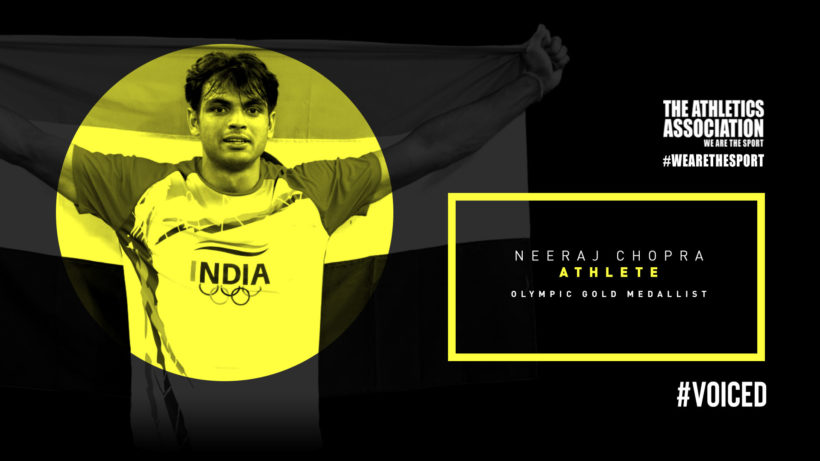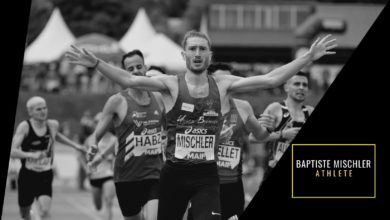Country: India
Profession: Athlete – Javelin
Career highlights:
- 2020 Olympic gold medallist
- 2018 Asian Games gold medallist
- 2018 Commonwealth Games gold medallist
- 2017 Asian Championships gold medallist
- 2016 World U20 champion and World U20 Record (86.48m)
- National record 88.07m
Neeraj is the first Indian track and field athlete to win a gold medal at the Olympics, this was also India’s only gold in Tokyo. Five years earlier at the 2016 World U20 Championships, he became the first Indian athlete to ever win a U20 World title and the first to set a world record.
Congratulations on becoming Olympic Champion! What did you feel the moment you realised you had won Olympic gold?
At the beginning, there was a powerful wave of emotion that I felt, but it took some time for the feeling to sink in and for me to realize that I had actually won an Olympic Gold. To win Gold at the Olympics is a dream for every athlete, myself included, and so it took a while for the feeling to fully register. But I did feel a very strong sense of pride and happiness about the achievement once it did.
What goes through your mind when the javelin is in the air after your throw?
It varies vastly from one throw to the other, to be honest. And the way I go about my throws, you can probably tell very easily what’s going through my mind! Because I’ve been throwing the javelin for so many years, I get to know the moment the javelin leaves my hand whether it’s a good or a bad throw. It just comes naturally; I don’t quite know how to explain it. And my body language also changes accordingly: if I feel the throw is good, my body language automatically becomes aggressive and pumped up, as you may have seen after the second throw in Tokyo. When I feel it’s not a good throw, I am just waiting to go back and try to come back better in my next attempt; and that’s also evident from the way I react 😊
How do you deal with the pressures of competing on a global stage?
I think at the Olympics the pressure comes automatically because it is considered the biggest stage for our sport. Compared to other major events, there’s always an added pressure that comes with the Olympics because it only comes once every 4 years (this time, it took 5 years!). Additionally, this was my first Olympics, so I did feel that pressure heading into the Games. Having said that, what helped was that I had had a very good training stint ahead of the Games and was in great physical shape with regards to my fitness. So, going into Tokyo, I knew that I had prepared the best way possible and was confident about doing well. That helped me deal with the pressure a fair bit because I knew I was at my best. Being able to breach the qualifying mark comfortably in my very first throw to qualify for the finals also helped ease some of those early nerves and boost my confidence.
Every athlete needs a team that will support and guide them, who makes up your team?
Absolutely, whether it’s an individual sport or a team sport, having a support team is extremely important for any athlete. For me, my immediate team comprises of my coach and physiotherapist, who were with me throughout during my preparation phase for Tokyo. My coach, Dr. Klaus Bartonietz ensured that I had a good training program to help me peak when it mattered most, and my physio, Ishaan Marwaha, was instrumental in keeping me injury free and my body in shape. The extended team, including family members and friends, also play a hugely important role in keeping the positivity, which I feel is supremely important for any athlete. While speaking to them, even during the Olympics, they never let me feel any sort of pressure and just let me be myself, which ensured I entered the Games with a very positive mindset.
Most athlete love to have their family around when competing, we find it interesting that you have never invited your family to watch you compete. Can you tell us what lead to this decision?
Yes, that’s something that I have noticed while competing that a lot of athletes do have their family members watching. In my case, it’s something that came about during my early days competing. At some point I began to feel that my natural aggressiveness during throwing was something that I couldn’t bring out in front of them, because I would tend to be a little more reserved if they were watching. That’s just something that I had earlier though, now I’m actually waiting to find the right moment to invite some of my family over to come and, hopefully, watch me do well at some major event. I think I would like to have them watch me from the stands while I’m competing now.
What impact do you hope your success will have on athletics in India?
There’s already been quite an impact and positive momentum from what I’m seeing and reading around me. There are many children who are taking up javelin and athletics in general, which is great to see. I think there was a mental block somewhere because of India’s history of never being able to win an Olympic Track & Field medal and there was a mindset that we are weaker than those from the other countries who are used to winning medals at the highest stage. To some extent, when I won the Junior World Championships and set the Junior World Record, I felt that us Indian athletes do have what it takes. Following my success at the 2018 Asian and Commonwealth Games and once I started competing, and doing well, at the Diamond League circuit, I actually felt strong mentally knowing that yes, we Indians can compete against the best in the world and excel. Leading into Tokyo with a good preparation, and following that up by returning with a Gold, I think it will do wonders for that mental block that Indian athletes potentially have and I hope this can be the start of a string of medals from our country’s talented athletes on the global stage.
Can you tell us an interesting fact about Indian culture?
To be honest, India is a massive and extremely diverse country with multiple states, languages and cultures. What I can talk about is the culture from my home state of Haryana in Northern India. The state has a strong culture of sport and physical fitness, with many parents taking active interest in their children pursuing sports and even the armed forces. A large part of the Indian contingent and medalists actually are from Haryana. Having said that though, there’s a growing and developing culture for sport across many states in India and with the momentum of this year’s successful Olympics, I am confident that we will be able to develop a solid culture for sports in India, which will hopefully see us win many more medals in the future.
Where are you at your happiest?
How much ever I like to travel and roam around different places, I am truly at my happiest when I’m on the ground, doing my training. It’s something I’ve grown up loving and something that makes me feel the most alive.
What is your screen saver photo on your phone right now?
It is currently a very nice picture I clicked myself of a javelin statue at the Inspire Institute of Sport, which is a training centre in India where I train at sometimes. The place has some wonderful scenery and the picture I have is of a lovely sunset when the javelin statue is silhouetted against the sky, which is almost an orange-pink hue. It just looks extremely picturesque.


